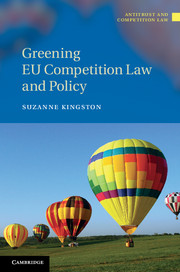Book contents
- Frontmatter
- Contents
- Foreword
- Acknowledgements
- Abbreviations
- Introduction
- Part I Should environmental goals play a role in EU competition law and policy?
- 1 Environmental protection in EU competition theory to date
- 2 The rise of the market in EU environmental policy
- 3 Why environmental protection goals should play a role in EU competition policy: a legal systematic argument
- 4 Why environmental protection goals should play a role in EU competition policy: a governance argument
- 5 Why environmental protection goals should play a role in EU competition policy: an economic argument
- Part II The role of environmental protection in EU competition law and policy in practice
- Part III Conclusions
- Select bibliography
- Index
- References
4 - Why environmental protection goals should play a role in EU competition policy: a governance argument
from Part I - Should environmental goals play a role in EU competition law and policy?
Published online by Cambridge University Press: 05 November 2011
- Frontmatter
- Contents
- Foreword
- Acknowledgements
- Abbreviations
- Introduction
- Part I Should environmental goals play a role in EU competition law and policy?
- 1 Environmental protection in EU competition theory to date
- 2 The rise of the market in EU environmental policy
- 3 Why environmental protection goals should play a role in EU competition policy: a legal systematic argument
- 4 Why environmental protection goals should play a role in EU competition policy: a governance argument
- 5 Why environmental protection goals should play a role in EU competition policy: an economic argument
- Part II The role of environmental protection in EU competition law and policy in practice
- Part III Conclusions
- Select bibliography
- Index
- References
Summary
Introduction
A second argument of principle regarding the role of environmental factors in EU competition policy is a governance argument. This argument adopts a different, non-legal perspective to that of the systematic argument. In brief, the governance argument begins from a simple premise: in a system with multiple policy objectives such as the TEU and TFEU, the goals of the system overall will be more efficiently and more effectively achieved where the governance of one part of the system takes the aims of another part of the system into account. This premise expresses a principle of coherence which is fundamental to good governance theory, as well as to the 2001 White Paper on European Governance (‘the White Paper’), the main (and one of the only) policy documents setting out the approach of the Commission to EU governance. Any attempt to exclude environmental considerations from competition analysis would, therefore, breach vital principles of good governance.
Coherence of policy action as a requirement of good governance and its application to environmental policy
The concept of governance enjoys a long pedigree in the political science literature, but its meaning and definition remain contested. A huge amount has been written attempting to identify and analyse the specific features of European governance, and this chapter does not attempt to offer a full review of such literature. This debate was revisited and revived in the run-up to, and following the publication of, the White Paper.
- Type
- Chapter
- Information
- Greening EU Competition Law and Policy , pp. 126 - 162Publisher: Cambridge University PressPrint publication year: 2011

